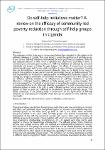| dc.description.abstract | The motivation of this study was to review some hitherto less attended to information on the self-help initiatives in Uganda. This study aimed to assess the significance of self-help groups in the country. Self-help initiatives have existed for some good time but academics have not paid adequate attention to their mode of operation and significance especially in terms of contributing to community poverty reduction. Self-help initiatives are attempts by concerned individuals and groups to bridge the gaps between the efforts of governments at overall national development and the near-total invisibility of many of these communities. Provided they are demand-driven and environmentally friendly, there are no limits to the range of projects that qualify to be executed in the rural communities through self-help initiatives. The only requirements are institutional capacity and/or the willingness to build one, support, and manage such projects sustainably. Consequently, this study analyses a set of four aspects, viz. the different self-help initiatives, the effectiveness of self-help initiatives in poverty alleviation, challenges faced by different self-help groups, and the coping strategies. The outcomes suggest the critical role of governments in providing the enabling environment and in moderating the forces of culture and ethnicity, as residents of a rural community strive for self-emancipation in order to be able to exert sufficient control over an environment that appears to them as given and inflexible to the elements favouring self-help groups. This article contributes to the growing body of information on the significance of self-help initiatives by emphasizing considerable efforts that can be adopted to make self-help more meaningful. | en_US |

